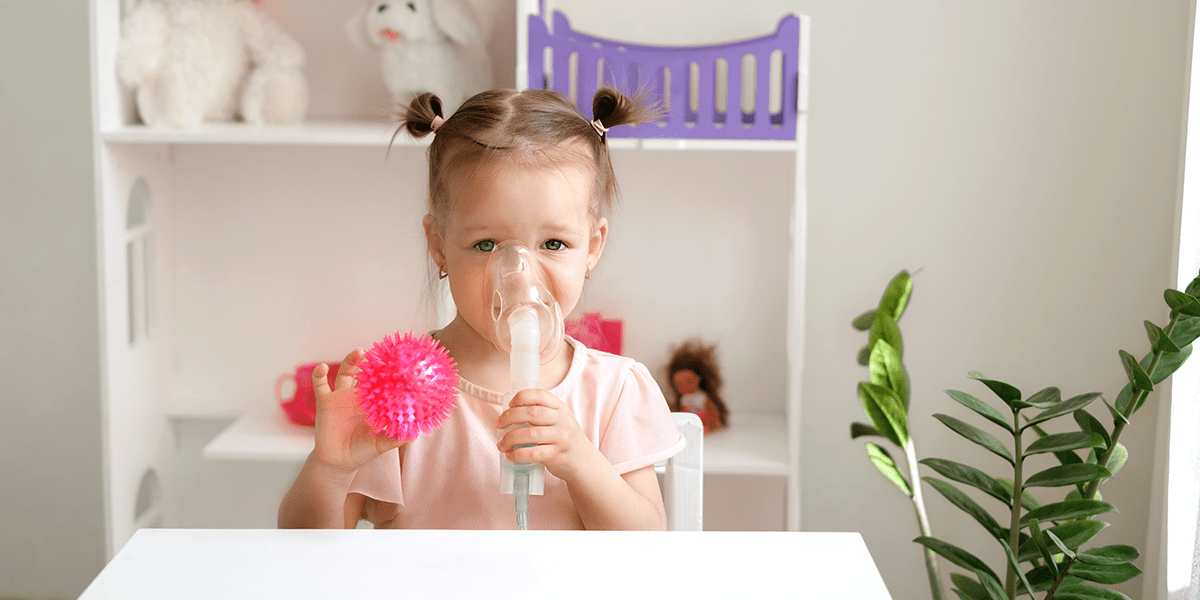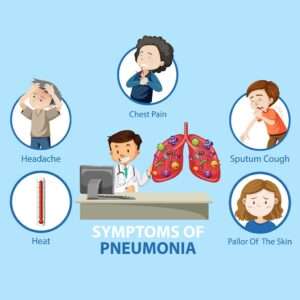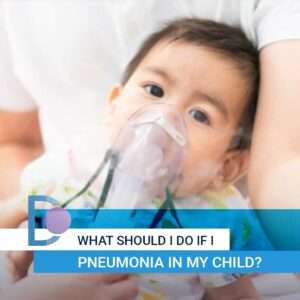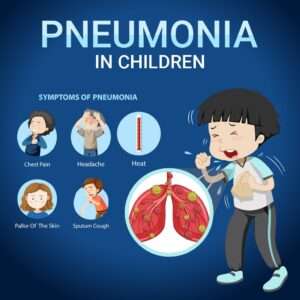Pneumonia in Children – Symptoms, Causes, and Effective Treatments
- Dr Owais Rafiq
- November 29, 2023
- 3:01 pm

Do you know pneumonia stands as the leading infectious cause of children’s deaths worldwide? According to the World Health Organization (WHO), approximately 14% of fatalities among children under 5 years old across the globe are attributed to pneumonia each year.
Pneumonia is a lung infection that can affect children. When a child has pneumonia, the tiny air sacs in their lungs become filled with fluid or pus, making it harder for them to breathe. Your child may experience mild to severe illness, depending upon their immune response.

Causes of Pneumonia in Children:
Pneumonia is an infectious disease triggered by different pathogens entering the lungs which can be viruses or bacteria.
- Viral pneumonia
- The most common viral pneumonia is caused by Respiratory syncytial virus (RSV)
- Other viruses include Influenza and adenovirus.
- Bacterial pneumonia
- The most common bacterial cause is Streptococcus pneumoniae
- Haemophiles influenzae type b (Hib) is the 2ns most common organism
In some cases, aspiration pneumonia in children can occur when a child inhales foreign substances into the lungs, initiating inflammation.

How does my child get pneumonia?
Pneumonia is caused by highly contagious pathogens that spread mainly through respiratory droplets. Your child can catch pneumonia by:
- Respiratory droplets from coughs or sneezes
- Touching surfaces contaminated with infected droplets
- Coming in close contact with infected individuals
- From mother to baby by blood, shortly after delivery.
What happens to my child in Pneumonia?
Recognizing the symptoms of pneumonia in children is crucial for early diagnosis and treatment. Your child may experience:
- High-grade fever (>102 °F) with chills
- Rapid, difficult, and noisy breathing
- Cough
- Tiredness
- Chest pain
- Bluish skin or lips (due to lack of oxygen)
- loss of appetite.
Younger children and infants might exhibit additional symptoms like
- Vomiting
- Refuse to take feeds
- Extreme fussiness
What should I do if I suspect Pneumonia in my child?
Viral pneumonia generally tends to have milder symptoms developing over time. Children with viral pneumonia do not need antibiotics.
Bacterial pneumonia can cause a severe illness that can have fatal consequences. In some cases, it needs to be treated at a hospital with the use of antibiotics given through blood. If you observe pneumonia symptoms in your child, consult your doctor promptly. The physician will conduct a thorough examination and might request a chest X-ray to visualize the lungs for confirmation of diagnosis, initiating appropriate treatment.
Additionally, blood or sputum tests may be needed to know the exact cause of the pneumonia.
How can parent help in the management of pneumonia?
- Adhere to the doctor’s instructions for medications, dosage, and schedule. Complete the course of antibiotics, if given.
- Make sure your child drinks plenty of fluids and eats nutritious meals to aid recovery.
- Provide rest to your child for faster healing.
- Closely watch the symptoms for any exacerbation and report to the doctor.
- Maintain good hand hygiene through regular hand washing
- Encourage your child to cover their coughs and sneezes to prevent the spread.
- Follow up with your physician to track progress.
It’s particularly important to monitor breathing patterns and seek immediate medical attention if breathing becomes rapid, labored, or accompanied by bluish skin coloration.
Suggested to Read: Pavlik Harness Guide -Usage, Care, and Results
Vaccination for Pneumonia:
Vaccines play a crucial role in the prevention and spread of pneumonia by building immunity in children. Vaccines like the pneumococcal conjugate vaccine and the Hib vaccine are highly effective in preventing some of the major bacterial causes of pneumonia.
The influenza vaccine in the form of “Flu shots” is also recommended annually to protect against the flu virus, a common trigger for viral pneumonia.
Dr Owais Rafiq
Subscribe to Dr Owais YouTube channel
For parenting advice, child health, symptoms, causes and treatment of illness in children.






